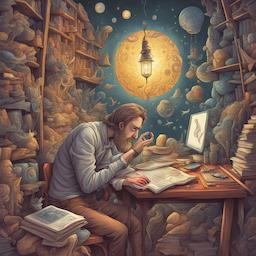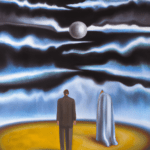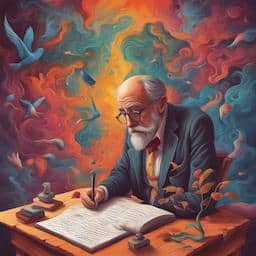Metaphysical fiction, also known as speculative fiction, is a genre that deals with the questions and ideas that go beyond the physical world. It often involves exploring the mysteries of the universe, the nature of reality, and the human experience. One aspect that is often explored is the mystical in metaphysical fiction. The mystical refers to a sense of the transcendent or the divine, and it is often used to convey a sense of wonder, awe, and mystery. In this article, we will explore how the mystical is used in metaphysical fiction and what it adds to the genre.
Mystical in Metaphysical Fiction

One of the most prominent ways in which the mystical is used in metaphysical fiction is through the use of magic. Magic is a common theme in metaphysical fiction, and it is often used to explore the mystical aspects of the world. Magic is often depicted as a mysterious and powerful force that can be used to achieve extraordinary things. In many metaphysical fiction works, magic is used to explore questions about the nature of reality and the human experience. For example, in Neil Gaiman’s “American Gods,” magic is used to explore the relationship between gods and humans and the power of belief.
Another way in which the mystical is explored in metaphysical fiction is through the use of symbolism. Symbolism is a powerful tool for conveying ideas and emotions that are difficult to express directly. In metaphysical fiction, symbolism is often used to explore the mystical and spiritual aspects of the world. For example, in Hermann Hesse’s “Siddhartha,” the river is used as a symbol for the journey of self-discovery and enlightenment. The river is seen as a mystical force that can help the protagonist achieve a higher state of consciousness.
Metaphysical fiction also often explores the concept of the afterlife, which is inherently mystical. The afterlife is a topic that has fascinated humans for centuries, and metaphysical fiction often uses this fascination to explore the mystical aspects of the world. For example, in Audrey Niffenegger’s “The Time Traveler’s Wife,” the concept of time travel is used to explore the idea of a soulmate that transcends time and space. The novel explores the idea that love is a force that can transcend death and the physical world.
The concept of the divine is also often explored in metaphysical fiction. The divine is often seen as a mystical force that is beyond human understanding, and it is often used to explore questions about the meaning of life and the nature of reality. In Neil Gaiman’s “Good Omens,” the concept of the divine is explored through the relationship between an angel and a demon. The novel explores the idea that the divine is not necessarily a force of good or evil, but rather a force that is beyond human comprehension.
One of the most interesting things about the use of the mystical in metaphysical fiction is the way in which it can be used to challenge the reader’s beliefs and assumptions. The mystical is often used to create a sense of wonder and awe that can challenge the reader’s worldview. In “The Alchemist” by Paulo Coelho, the mystical is used to explore the idea that the universe is conspiring to help us achieve our dreams. The novel challenges the reader to consider the possibility that there is a mystical force at work in the world that is guiding our lives.
The use of the mystical in metaphysical fiction adds a sense of wonder, awe, and mystery to the genre. Magic, symbolism, the afterlife, the divine, and challenging the reader’s beliefs are all ways in which the mystical is explored in metaphysical fiction. The mystical is a powerful tool for exploring the mysteries of the universe, the nature of reality, and the human experience. Metaphysical fiction provides a unique platform for exploring these topics in a way that can challenge the reader’s beliefs and assumptions. By using the mystical to create a sense of wonder and mystery, metaphysical fiction can provide a transformative experience for the reader. It can inspire them to explore new ideas and perspectives, to challenge their worldview, and to consider the possibilities of the unknown.
Overall, the mystical is an essential component of metaphysical fiction. It provides a sense of transcendence and mystery that can elevate the genre beyond the physical world and into the realm of the divine. Whether through magic, symbolism, the afterlife, the divine, or challenging the reader’s beliefs, the mystical is a powerful tool for exploring the mysteries of the universe and the human experience. Metaphysical fiction is a rich and diverse genre that continues to inspire readers to explore the unknown, and the mystical is a fundamental part of that experience.
Keywords: metaphysical fiction, mystical, magic, symbolism, afterlife, divine, challenge, worldview, transformation, mystery, mystical in metaphysical fiction, guide for mystical in metaphysical fiction, writers tips for mystical in metaphysical fiction, writing about mystical in metaphysical fiction, mystical in metaphysical fiction guide to writing
Check out our Novel Writing Workbooks
Check out Little Tree Food Forest for articles on food forests and homesteading.
Check out FoodieScapes for articles on growing, fermenting and preserving food
Check out StoryScapes.World for articles on writing.
Subscribe to our newsletter to get information delivered to your inbox on how to write a book, outlining your novel, keeping journals, marketing your novel, self-publishing, writing poetry and more.










